Why Nepal was Never Colonized?- 4 Principal Reasons
Was Nepal ever colonized? The straightforward answer is NO. Nepal has never been colonized by the British, Japan, or the Mughals. Nepal has always been independent since the first beginning of unification by King Prithvi Narayan Shah.
During the 18th century, most South Asian countries (almost all) were under the British Empire. Whereas Nepal was the only country capable to resist British Forces and stand to fight against the British Empire concluding, Nepal was never colonized and never been successfully invaded by any country around the globe. In fact, Nepal was expanding its kingdom in the East and west. It was growing as a dominant country while on the other hand, East India company was gradually capturing India.
East India Company wanted to expand its business from Nepal to Tibet and East Asia, so they made constant efforts to persuade the Nepalese Government to allow for trade. Nepal in assembled form and good at the economy as compared neighbours concluded the decision not to allow east India company to trade through Nepal.
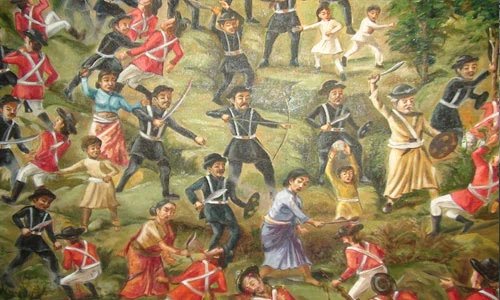
Why Britain Never Succeeded in Capturing Nepal?
Most think Britain spared Nepal, and Britain never wanted to take Nepal. But don’t be silly who spares millions of sq. Km of resourced and economic land if it can be captured easily.
So the question is, what was it? Why Nepal was never colonized and what stopped East India Company from expanding its coverage toward Nepal. Well, the question has become a mystery of the century. But We will try to give some of the most popular and preferable reasons that stopped Britain from expanding its hands over Nepal.
Why did the British not Colonize Nepal?
- Gurkhas were great warriors, and it was complicated to get victory over them: If you know a bit about history, especially the British colonization part then you should have heard about the bravery and the greatness of Gorkha warriors. Gurkhas are renowned as some of the bravest warriors in the world who sacrificed their lives in saving Nepal in the East and west.
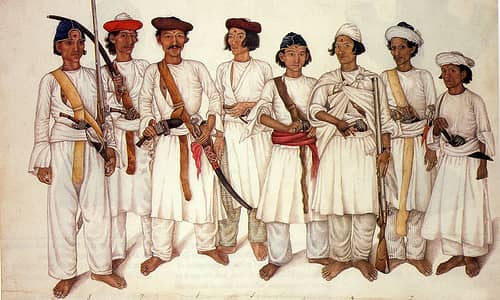
- Geographical condition of Nepal: Most of Nepal is Hill covered in the dense forest creating difficulties for the British army in fighting the war. Due to the unhabituated harsh climatic condition, Britain was less likely to win the war front to front, which ultimately helped Nepal becoming the winning side for a short period.
- Nepal was economically not much relevant to Britain as compared to some other areas of current India, and they had clearly understood about the difficulties and manpower required to get victory over Nepal, so they come with an idea to make the treaty.
- Nepal went in war with Britain when they were trying to maintain their foothold on South Asia not when they were in the pick of their dominance. So, it wasn’t any good for them to get involved in agelong battles.
You May Like: 10 Most Surprising and Wondrous Facts About Nepal
Causes of Anglo Nepal War (Gurkha War):
Nepal government was totally aware of what East India company was doing in India, so the Nepalese Government was not in favor of any trade with foreign. The immediate cause of the Anglo Gorkha war was a dispute over Butwal between the East India Company and Nepal. As expected, the East India Company sent a warning letter to the Government of Nepal to leave Butwal. Nepal was a relatively powerful country and any country at the position of power is not likely to give its territory easy-handed. So the GovernmentGovernment of Nepal didn’t agree to leave Butwal which ultimately started the Anglo Gurkha war.
The leading Causes of the Anglo Gurkha War
- Economic cause: East India company wanted to trade with Tibet through Nepal. When the Nepalese Government did not agree to allow for trade, they decided to attack Nepal.
- Affect in colonizing India: East India Company was expanding its power of control all over India while Nepal was uniting and was expanding towards India, which caused adverse impact colonizing India.
- Climatic Cause: As British Armies were habited to cold environment and India was not favourable for them. Hence, they were in search of place from where they can take all control and has the right climatic conditions and Nepal had a similar environment.
Anglo-Gurkha War
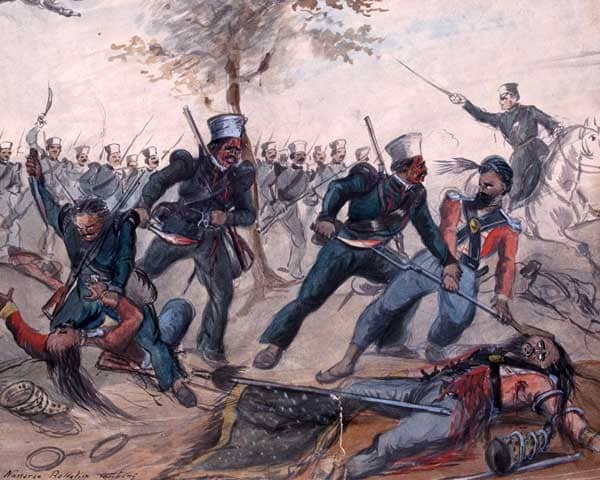
The Anglo-Nepalese War, also known as the Gurkha War, fought between the Kingdom of Gurkha and the East India Company started on November 1, 1814. It ended with the Sugauli treaty in 1816 is considered one of the most important treaties in the history of Nepal. During the war, Britain loosed many troops, while Nepal lost not much. You can imagine from this how brave were Gorkhas only 70 soldiers( including old peoples, children, and around 30 -40 adults) led by Balbhadra Kunwar killed about 5000–6000 British in the Battle of Nalapani at Nalapani Fort(Was part of Nepal currently of India, great Gorkha warrior fought at this place to defend Nepal).
Read About: Battle of Nalapani – An Epic Battle Fought by 600 Gurkhas
So, finally, when east India company realized that they had to lose many soldiers to invade Nepal, the war came to an end with Sugauli Treaty at Singha Durbar, Kathmandu, Nepal (first discussed in 1921), and the final treaty signed in 1923 December 21. Nepal loosed one-third of its party as a consequence of the agreement. Britain was in search of cold places, so they took places such as Nalapani, Kumar, Gadwal, Darjiling.
Consequences of the Sugauli Treaty
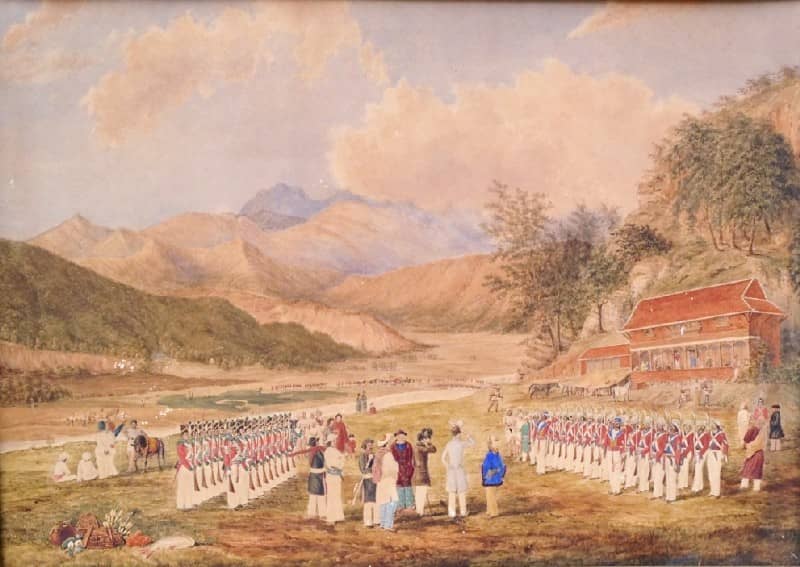
- Nepal lost one-third of it’s territories like Sikkim in the East, Kumaon and Garhwal in the west, and some Terai in the south.
- The friendship between Nepal and Britain
- Britain would be allowed to recruit Gurkhas for military service.
- Nepal will remain Independent and as result Nepal was never colonized
Map of Great Nepal
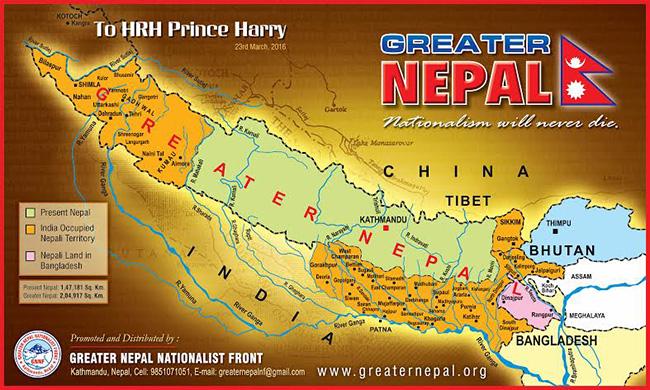
Conclusion– Was Nepal Colonized?
Some of you might be thinking I am trying to say Nepal won the war and Britain lost. But, I actually meant Nepal was a winning side for a short while, and seeking the possible future consequences of the war Nepal agreed to the treaty.
- Indeed the British Empire was capable of capturing Nepal, but it wasn’t easy as much as it was capturing small divided kingdoms of current India.
- Though Nepal was outnumbered in the war, one brave Gurkha warrior was capable of killing more than 20 enemies.
- It would cost a thousand skilled manpower and a considerable amount of capital to capture entire Nepal and also a measurable amount of time. It was better to make a treaty for both sides rather than the long-lasting war where both sides could lose a lot of manpower.
- It could be concluded, Nepal was never captured by any Europian country of the world form the day Nepal evolved as a country in the universe.
If you don’t agree with the fact that Nepal remained independent from the day Nepal has existed. I tried my best to explain why Nepal was never colonized and some causes of the Anglo-Nepalese war. Free to write your thoughts below in the comment section and I will try my best to update it with some of your kind thoughts. For further resources, you may refer to How Nepal Was Formed? Anglo-Gurkha War and British Colonization.
FAQ on Why Nepal was Never Colonized?
-
Who colonized Nepal?
No country in the world ever successfully Invaded and colonized Nepal. Though the British East India Company attempted to capture Nepal thrice but never successfully captured Nepal. Later a Peace treaty was concluded between Great Britain and Nepal was declared a sovereign country.
-
Has Nepal ever been conquered?
Never, Nepal has never been conquered by any external land. Nepal has remained Independent all the way till now. During seventeenth-century British attempted to invade Nepal but they consequently failed.
-
Was Nepal ruled by any country?
Nepal wasn’t ruled by any foreign country and has never been part of any other forces even partially. Nepal was ruled by u003cstrongu003eShahu003c/strongu003e Kings after the u003ca href=u0022https://knownepal.net/how-nepal-was-formed/u0022 data-type=u0022postu0022 data-id=u00228u0022u003eunificationu003c/au003e till the Federal Democratic Republic of Nepal was established in 2008.
-
Was Nepal Colonized?
No Nepal has never been a colony of any country in the world and Nepal is one among few country countries of the world that were never been under the rule of any other country.
-
Was Nepal a British colony?
No, Nepal was never a British colony. Though Britain and Nepal share their own history, Nepal always remained Independent thanks to fearless u003cstrongu003efurious Gurkha warriorsu003c/strongu003e.

Why did Nepal have to give up the lands if it had won the war as claimed by you Sir? The reason is below. You lost that war. Please don't rewrite history through your patriotic rose tinted glasses. Accept the facts. Now read below:
Unification of Nepal under Prithvi Narayan Shah, Nepal attempted to enlarge its domains, conquering much of Sikkim in the east and, in the west, the basins of Gandaki and Karnali and the Uttarakhand regions of Garhwal and Kumaon. This brought them in conflict with the British, who controlled directly or indirectly the north Indian plains between Delhi and Calcutta. A series of campaigns termed the Anglo-Nepalese War occurred in 1814–1816. In 1815 the British general Ochterlony evicted the Nepalese from Garhwal and Kumaon across the Kali River,[1][2] ending their 12-year occupation, which is remembered for its brutality and repression.[3][4]
Octherlony offered peace terms to the Nepalese demanding British suzerainty in the form of a protected state and the delimitation of Nepal's territories corresponding roughly to its present day boundaries. The Nepalese refusal to accede to the terms led to another campaign the following year, targeting the Kathmandu Valley, after which the Nepalese capitulated.[5][6]
Terms Edit
Historian John Whelpton writes:
Negotiations for a general settlement produced a draft which was initialled at Sagauli in Bihar in December 1815 and required Nepal to give up all territories west and east of its present-day borders, to surrender the entire Tarai and to accept a permanent British representative (or 'resident') in Kathmandu. The Nepalese government initially balked at these terms, but agreed to ratify them in March 1816 after Ochterloney occupied the Makwanpur Valley only thirty miles from the capital.[7]
Qouted from Wikipedia.
To keep the people of Nepal safe from war. I think Nepal decided to give up lands because Nepal had always believed in peace rather than the continuous war which could cause Nepal also captured thousands of deaths and the land Nepal gave to Britain, and there was no point in protecting the occupied land by sacrificing thousands of soldiers and innocent people of Nepal.
If Nepal won the war why did it accept the british conditons
The Anglo Nepali war was an odd one. The Brits fighting at Nalapani were professionals recruited by the East India Company and knew their craft. They attacked the fort at Nalapani and were impressed by the bravery and skill of the Nepalese troops. Within a short time that respect was returned by the Nepalese warriors. A Scotsman traveling with the EIC reported that a wounded Nepalese soldier crossed the broken down wall of the fort to get medical care.
" While the batteries were playing, a man was perceived on the breach, advancing and waving his hand. The guns ceased firing for a while, and the man came into the batteries: he proved to be a Ghoorkha, whose lower jaw had been shattered by a cannon shot, and who came thus frankly to solicit assistance from his enemy.
It is unnecessary to add, that it was instantly afforded. He recovered; and, when discharged from the hospital, signified his desired to return to his corps to combat us again: exhibiting thus, through the whole, a strong sense of the value of generosity and courtesy in warfare, and also of his duty to his country, – separating completely in his own mind private and national feelings from each other, – and his frank confidence in the individuals of our nation, from the duty he owed his own, to fight against us collectively. "
After the war ended the East India Company and later British Army officers returned to Nepal to recruit Nepalese soldiers. And Nepalese men have been recruited by the Brits to this day. I can't tell you how many tea houses I have been in while traveling about Nepal that have an old photo of a young Ghurka soldier in his British uniform on the wall of the dining room. That career gave the Ghurka enough money to return to Nepal upon his retirement and buy a tea house to employ his family. Frequently if you looked around, you would see an old man looking a great deal like an older version of that young soldier in the photo.
Nepal is still tough traveling, but it is a magic place.
Thanks! It feels really good when someone gives a positive response to the motherland. I think You would love to check How Nepal was formed? Anglo-Gurkha War and British colonization
If Nepal was winning the war, then why as part of the treaty the British conditions were acknowledged. In fact the treaty should have been valuing Nepal and more land would have been added to Nepal not vice versa.
….and then, in the fullness of time, Britain now has a Gurkha regiment.
During the second world war my uncle was in Burma. He rarely spoke of his time there (very few of the ex-Burma campaign veterans did) but he told my father once that he didn’t know what the Japanese soldiers thought about the Gurkhas but the Gurkhas sure as hell terrified him and they were on his side! Very brave soldiers the Gurkhas then and now.
YEAH I AGREE WITH YOU
Logical and fair conclusion: British are well known for spreading death, terror and cruelty all over the world. Their wealth, as they proudly name their organization, is based on nothing but blood money. Money that lies upon lives of truly peaceful countries and people. Is that not a great stain of shame in your pathetic history? A nation that stands so proud for its accomplishments is nothing but a nation of criminals. Stop writing about your stupid wars and who won and lost. You DID lose all the wars because the souls of the ones you slaughtered without any mercy or respect, nothing but upholding the values of greed, will claim your demise.
Oh! I think You Would love to Check How Nepal Evolved as Country? and Thanks for valuable information
Is napal still under monarch rule?
No, It’s Not Inder Monarch rule anymore.
What about Bhutan? Was it always independent?
Yeah Bhutan has been independent so far
This is horribly written.
Then rewrite it instead of complaining.
Shameful that Nepalese Gurkhas continue to be enforcers for the British tyrants. Of course their individually brave etc but what’s the use of ones talent is abused on behalf of evil? The entire British Empire depended upon both Nepalese and Indian recruits. This was also their Achilles heel. When Netaji influenced the Indian troops to mutiny, the Brits finally let India raise it’s own flag.
The Brits were so ungrateful that only in 2002 did the Queen officially recognize and honor the Indian Sepoys.
Yes but it was a part of friendship, Gurkhahelped Britain by their choice not the British forced them. In return They returned a portion of lost land on Nepal.
This article was difficult to read because the English language also failed. That is a shame because the topic is quite interesting. The article needs some serious proofreading and correction.